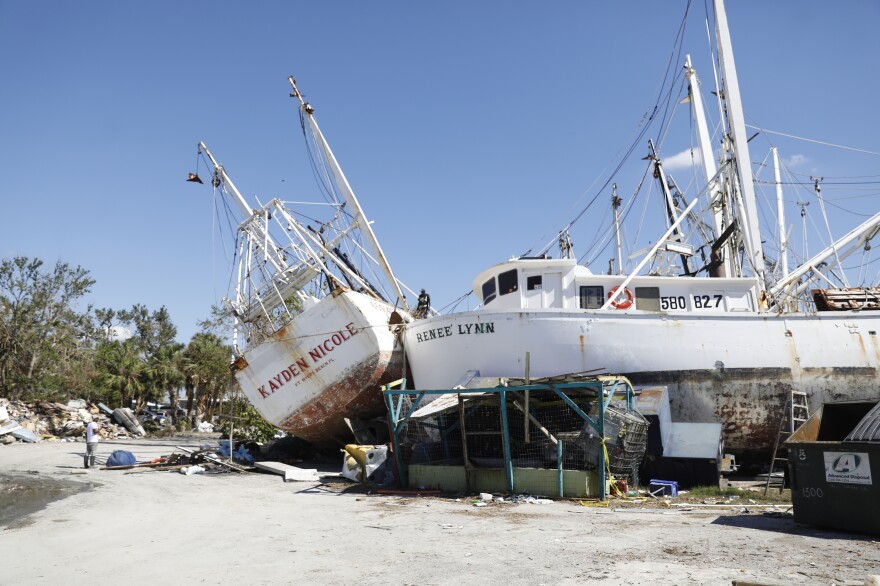Jimmy Driggers, 85, got into the fishing business when he was just 13 years old. He's a shrimper in Fort Myers, Fla.
"I was a mullet fisherman, [a] commercial fisherman in my younger days," he said.
Driggers walks with a prosthetic leg from an injury he sustained on his boat about a decade ago. It's decorated with a sea lighthouse.
He owns one shrimping boat — the Miz Shirley — named after his wife. It can carry 50,000 pounds of shrimp.
Driggers said the industry has been hurting for decades, and that he was paid more back in the 1980's than he is today. Fuel prices have skyrocketed.
"You have to produce a lot of shrimp to stay afloat," Driggers said. "And that's what we were doing for the last year — just staying afloat, not making enough to fix anything that broke. It was tough."
Then came Hurricane Ian. It pushed The Miz Shirley half onto a seawall and half was left in the water –- unusable.

When Ian made landfall in Florida in late September, it hit the shrimp fishing industry particularly hard. For decades, it's been an important part of the economy in Fort Myers — integral to the region's culture and identity. Now, it's at a standstill.
"We thought about selling out, but I don't want to do that, if we can hold on," Driggers said. "If we can get the boat off and get it repaired, and back in working order." He acknowledges that it's going to take a lot of work.
Driggers' home, which backs a water channel, will have to be demolished. It got four inches of water during the storm and mold is growing everywhere. He and Shirley don't have flood insurance.

The couple has been sleeping in a donated camper in their front lawn. They're hoping the insurance on the boat will cover enough of the repairs to keep them in business — but they haven't been able to assess the damage yet.
Despite all this uncertainty, Jimmy won't consider retiring. Shirley says he won't walk away from the water.
"There is a smell when everything is natural, there is a smell here that's nowhere else," Jimmy said. "I've been to Texas, Louisiana, Mississippi and Alabama, but here there's a smell to me."
"It's the smell of the water," Shirley said, finishing her husband's sentence.
With boats still on land, uncertainty sets in
Down at the Fort Myers Beach shrimp fishing docks, piles of boats line the sea wall and roads. A big hydraulic excavator with shears is tearing a boat apart to haul to the landfill.
On the Fort Myers coast, only 45 boats are licensed to fish for shrimp. They mostly catch pink shrimp — a highly-priced delicacy known for their sweet flavor and firm flesh.

"All of the people that work for us — whether they worked on the boats, in the fish house, in the market, and even me — we no longer have a paycheck," said Christine Gala, the owner of Trico Shrimp Company. With a fleet of 12 boats Trico is one of the two big shrimping companies on San Carlos Island in Fort Myers Beach.
"We have no job — except to call people and beg them to get our boats back in the water," she said.
None of Gala's boats are insured. Since Ian hit, she's taken on a leadership role.
Gala has been on the phone constantly, calling crane operators and state officials asking for help — to get boats back in the water, and rebuild critical infrastructure. The shrimping docks are completely destroyed.
Then the water will need to be cleaned up — it's filled with dock pilings and other debris.

Shrimp fishing is a small, but valuable industry in the United States, valued at $37 million. More than 75% of the pink shrimp harvested in the U.S. comes from the west coast of Florida.
Andrew Ropicki, who teaches marine resource economics at the University of Florida, said the industry has been struggling to compete with foreign imports since the 1980s.
But he's optimistic that it can rebound from Ian.
"If federal and state agencies and others involved look at it and see how important this is — one of the last true working waterfronts that's in a very urbanized area," Ropicki said.
"I'm hopeful. I know there are people working on it and trying to help these folks," he said.
'A very strong community': Shrimpers remain committed to fishing and to Fort Myers
Joanne Semmer is the president of the Ostego Bay Marine Science Center, a local environmental nonprofit in Fort Myers. She lives on San Carlos Island, just steps away from the commercial fishing docks and working waterfront. Her neighborhood is filled with piles of debris and boats — and her home got flooded during Ian.

Semmer said that despite the many challenges — including government regulations and limited docks — the shrimp fishing industry has adapted to change.
"We have a very strong community — it's an old fishing village-type community," Semmer said. "People live here because that's where they want to be."
Ricky Moran is the captain of a shrimping boat called The Galante. He started shrimping with his dad when he was nine years old.
Moran said he finds serenity in the water — and he wants to stay in Fort Myers, where he's lived and worked for 35 years.
"I ain't going nowhere," Moran said. "I'm going to stay here and help clean up. I love Fort Myers Beach."

At the docks, 58-year-old Moran pushes his way through the wreckage to the site where The Galante landed. The boat sits on its side, wedged between two other large vessels, next to a severely damaged mobile home park.
Moran not only lost his boat, but also his home. He lived in The Galante and rode out the storm on board with his girlfriend.
But right now, Moran wants to be on land. He's still haunted by memories of the storm. Unable to return to his boat, Moran is now living in a tent in the marina and applying to FEMA's unemployment plan.

He's stuck in limbo, waiting — like dozens of others — to be back on a boat in the industry that provides not just his home, but also his way of life. He gets emotional talking about why he's staying.
"I took a loving to this thing," Moran said. "I'm a commercial fisherman — I'm Captain Ricky. I could leave. Go up to Mobile [Alabama] and get a boat — but I want to see this here come back."
Copyright 2023 NPR. To see more, visit https://www.npr.org.






